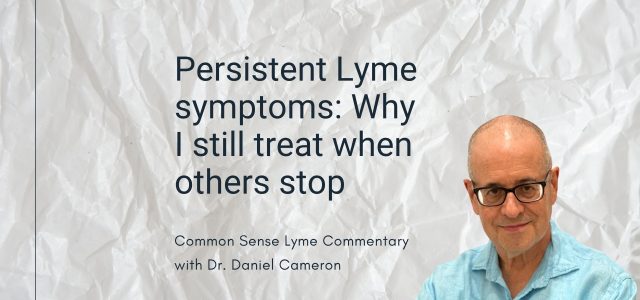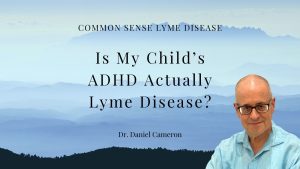
As a Lyme disease specialist, I’ve treated many patients who continue to suffer from persistent Lyme symptoms—even after completing a full course of antibiotics. They’re often told their fatigue, brain fog, joint pain, or headaches are simply “post-treatment Lyme disease” or stress-related. But that explanation doesn’t reflect what I see in my practice—or what my patients experience every day.
A 2023 study in Emerging Infectious Diseases adds critical insight. It found that patients with lingering symptoms after Lyme neuroborreliosis had elevated levels of interferon-alpha (IFN-α)—a protein typically released when the immune system is actively fighting an infection. The more severe the symptoms, the higher the IFN-α levels. These elevations persisted for months after treatment.
While the authors suggest this may reflect a misfiring immune response, I ask a different question: What if the immune system is still reacting to a persistent tick-borne infection we haven’t yet eradicated?
When Tests Fall Short
Current Lyme disease tests have well-documented limitations. They often fail to detect low-level or tissue-based Borrelia burgdorferi, especially after antibiotic treatment. Blood work, spinal taps, and even PCRs can all return negative—even when patients remain clearly symptomatic.
In my practice, some patients with persistent Lyme symptoms only begin to improve after longer or repeated antibiotic therapy, despite having negative tests. Others are later diagnosed with co-infections like Babesia or Bartonella, which require different treatment strategies. These cases suggest that tick-borne infections can remain active, even when laboratory results appear normal – contributing to persistent symptoms of Lyme disease or other co-infections.
Why I Support Retreatment in Select Cases
Some studies claim that additional antibiotic treatment doesn’t help. But many of those clinical trials had serious limitations:
- They treated patients late in the course of their illness.
- They used short or inadequate antibiotic regimens.
- They did not account for co-infections.
- They lacked reliable methods for confirming infection clearance.
In contrast, when I tailor treatment based on a patient’s symptom pattern, immune function, and possible co-infections, I often see meaningful improvement. That’s why I continue to support retreatment in select cases, especially when persistent Lyme symptoms are interfering with a patient’s quality of life.
What Might Be Causing These Symptoms?
The elevation of interferon-alpha suggests that something is continuing to stimulate the immune system. The cause could be: autoimmune responses triggered by the infection; residual bacterial debris; a low-grade, persistent infection that current diagnostics cannot detect.
We don’t yet have a definitive way to distinguish between these possibilities in every patient. But the immune system is clearly responding to something—and that deserves serious attention.
For Patients Who Are Still Struggling
If you’re still experiencing persistent Lyme symptoms, you are not alone—and you are not imagining it.
This recent research confirms what many patients have long known: the immune system may remain active long after antibiotic treatment, possibly due to an ongoing infection. Until we have better diagnostic tools, we must:
- Recognize the limits of current Lyme testing
- Reassess the relevance of outdated retreatment trials
- Consider chronic Lyme infection as a valid clinical concern
- Respect and trust patient experiences—not just lab values
Final Thoughts From My Practice
In nearly four decades of treating Lyme disease and co-infections, I’ve seen firsthand that persistent symptoms deserve investigation—not dismissal. My approach includes:
- Evaluating for overlooked or hidden co-infections
- Personalizing antibiotic duration and combinations
- Supporting both immune and emotional recovery
Whether these symptoms are driven by unresolved infection, immune dysregulation, or both, the key is not to give up too soon. Patients deserve answers—not assumptions. I’ll keep asking the hard questions until we find them.
🧠 Learn More



Thank you for understanding and listening so many don’t!
I’m 80 years old and struggled with debilitating symptoms such as headaches, mental fog, muscle pain, fatigue, neurological pain for over 20 years. I was sent to every specialist like rheumatologist, neurologist, orthopedist, psychiatrist, until in 2015 a GP took a blood test for Lyme and was called by the CDC to tell me it was positive for Lyme and babesia. They questioned me as to where I lived, visited etc. then told me to find an infectious disease doctor to treat but after calling all in Ft Myers Fl no one would treat lime. Months later I found a PA who agreed to treat me and I had a long round of doxycycline and drugs for babesia. I started to feel better but never back to normal. It’s now 2025 and most symptoms seem to be recurring but doctors here in Virginia where I know live blame my symptoms on old age. I’m just waiting to die as I have little quality of life.
I am sorry to hear you are having problems despite early gains. i blogged on this problem at https://danielcameronmd.com/geriatric-babesia-rising-longer-treatment/
Thank you for your vulnerable post. I am fairly new with this Lyme fight, less than a year in. I see how strong you have been to trudge through each day. I am already struggling to want the days to continue as this pain is unbearable at times and quality of life feels defeating. Today is a good day for me and I hope you also. Thank you for making me not feel quite so alone in this.